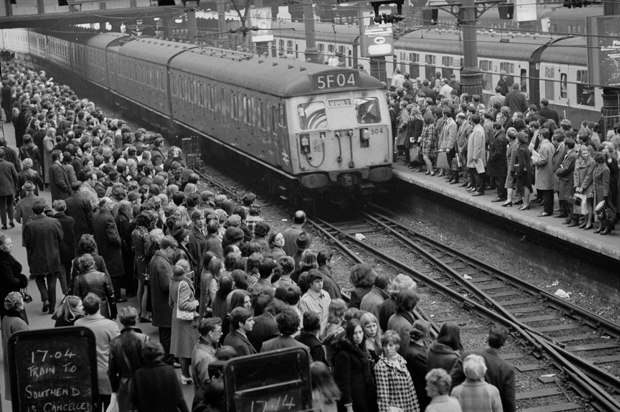In the early days of Victorian railways, train journeys were (rightly) considered so dangerous that ticket offices sold life insurance as well as tickets. There were no onboard toilets until the 1890s, meaning that passengers either had to cross their legs or buy a ‘secret travelling lavatory’, consisting of a rubber tube and bag hidden inside the clothes. Some traditions, though, were already well-established. ‘The real disgrace of England,’ wrote Anthony Trollope in 1869, ‘is the railway sandwich.’
These three facts all come from the first chapter of Iain Gately’s exploration of commuting. They also serve as a neat summary both of what’s best and what’s most odd about Rush Hour as a whole. On the one hand, they’re the sort of fascinating snippets that you may well find yourself wanting to tell friends in the pub. On the other, they don’t actually have much to do with commuting, as opposed to rail travel more generally. While Gately’s title, subtitle and introduction firmly suggest a book about the daily journey to and from work, what we get instead is nothing less than a globe-trotting social history of transport over the past 200 years.
Indeed, the result often feels as if Gately is throwing in anything he’s discovered that he thinks we may find interesting, from the rise of sans-serif typography to life in an Indian call centre (a lot better than you might imagine). At one characteristic point, he remembers ironing his shirts in his own commuting days — before adding a footnote that begins, ‘The desire to smooth and flatten our garments has been present since the days of the Vikings, whose graves contain whalebone “smoothing boards”…’
Luckily, then, he’s almost always right about what’s interesting — his endlessly sharp eye for the memorable historical detail matched by an equally sharp one for the telling statistic (‘China… didn’t get its millionth car until 1992, a figure America reached in 1912’).








Comments
Join the debate for just £1 a month
Be part of the conversation with other Spectator readers by getting your first three months for £3.
UNLOCK ACCESS Just £1 a monthAlready a subscriber? Log in